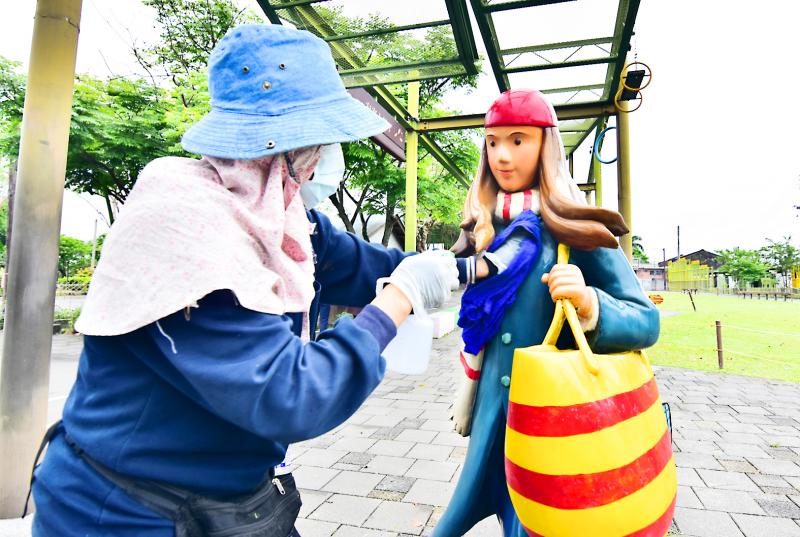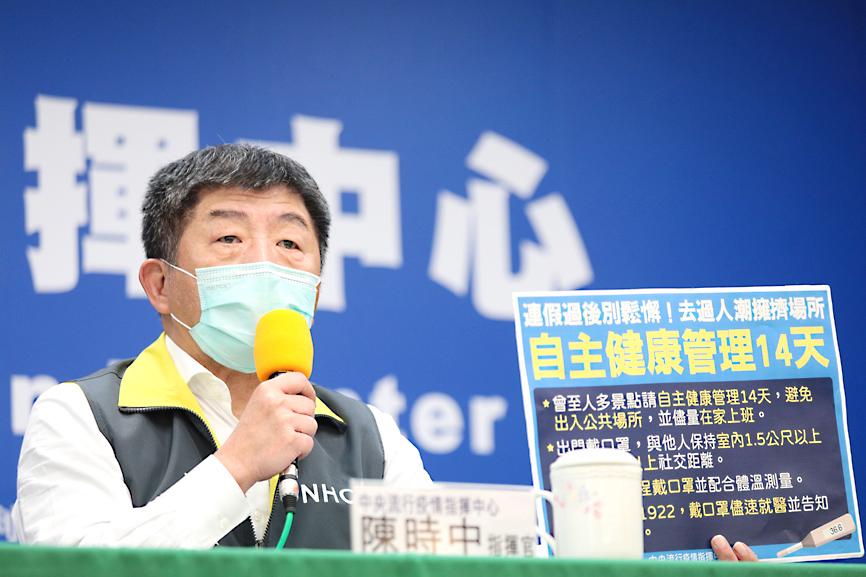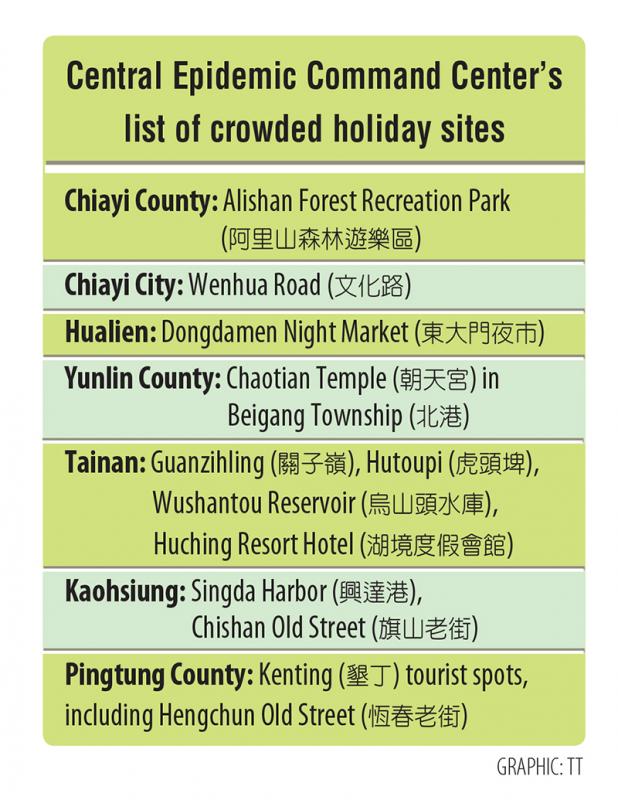People who visited crowded areas or activities over the Tomb Sweeping Day long weekend should start practicing 14 days of self-health management, the Central Epidemic Command Center (CECC) said yesterday.
The large crowds at popular scenic areas and tourist spots over the four-day holiday that ended on Sunday triggered concerns about the risk of COVID-19 transmissions.
“In order to enhance the nation’s disease prevention capacity, we require people to make advance preparations for flexible working hours and working spaces,” said Minister of Health and Welfare Chen Shih-chung (陳時中), who heads the center.

Photo: Chang Yi-chen, Taipei Times
“People who visited crowded places or activities should wear a mask, avoid unnecessary outings, strictly practice social distancing, avoid going to school or work if they develop any symptoms and seek medical attention or the call the 1922 hotline,” the minister said.
They should tell their doctor if they develop symptoms such as a fever, coughing, other respiratory problems, diarrhea, or a loss of the senses of smell or taste, he said.
It would be best if people under self-health management work at home, while students should tell their teachers about their travel history, and healthcare professionals should expand their testing criteria to include people who recently visited crowded sites who have symptoms that cannot be excluded from the possibility of COVID-19 infection, Chen added.

Photo: CNA
However, by “crowded places or activities” the center was not just referring to the 11 tourist spots that it listed in text messages on Saturday reminding the public to avoid crowded places and keep a proper social distance, Chen said.
If people visited other crowded places for a prolonged length of time over the long weekend, they should also practice self-health management, and if they cannot work at home, they should strictly practice the aforementioned measures, as well as social distancing, wearing a mask and frequently washing their hands, he added.
The government cannot provide a comprehensive definition of “crowded places” and it is up to every person to protect themselves, their coworkers and their family when making such decisions, he said.

Employers cannot punish employees who ask for sick leave if their recent travel history could have put them at risk and are experiencing symptoms of COVID-19, he added.
While Chen said he was sorry that some store owners at tourists sites felt the center’s warnings had cost them business, the crowds at such sites had been far worse than the center had anticipated, and the cost to society from cluster infections would be greater than such losses.
The warnings had been necessary, he said.
The CECC would not ban all business activities, but it would adjust policies according to the current situation, with “disease prevention the priority,” he said.

CHAOS: Iranians took to the streets playing celebratory music after reports of Khamenei’s death on Saturday, while mourners also gathered in Tehran yesterday Iranian Supreme Leader Ayatollah Ali Khamenei was killed in a major attack on Iran launched by Israel and the US, throwing the future of the Islamic republic into doubt and raising the risk of regional instability. Iranian state television and the state-run IRNA news agency announced the 86-year-old’s death early yesterday. US President Donald Trump said it gave Iranians their “greatest chance” to “take back” their country. The announcements came after a joint US and Israeli aerial bombardment that targeted Iranian military and governmental sites. Trump said the “heavy and pinpoint bombing” would continue through the week or as long

TRUST: The KMT said it respected the US’ timing and considerations, and hoped it would continue to honor its commitments to helping Taiwan bolster its defenses and deterrence US President Donald Trump is delaying a multibillion-dollar arms sale to Taiwan to ensure his visit to Beijing is successful, a New York Times report said. The weapons sales package has stalled in the US Department of State, the report said, citing US officials it did not identify. The White House has told agencies not to push forward ahead of Trump’s meeting with Chinese President Xi Jinping (習近平), it said. The two last month held a phone call to discuss trade and geopolitical flashpoints ahead of the summit. Xi raised the Taiwan issue and urged the US to handle arms sales to

State-run CPC Corp, Taiwan (CPC, 台灣中油) yesterday said that it had confirmed on Saturday night with its liquefied natural gas (LNG) and crude oil suppliers that shipments are proceeding as scheduled and that domestic supplies remain unaffected. The CPC yesterday announced the gasoline and diesel prices will rise by NT$0.2 and NT$0.4 per liter, respectively, starting Monday, citing Middle East tensions and blizzards in the eastern United States. CPC also iterated it has been reducing the proportion of crude oil imports from the Middle East and diversifying its supply sources in the past few years in response to geopolitical risks, expanding

Pro-democracy media tycoon Jimmy Lai’s (黎智英) fraud conviction and prison sentence were yesterday overturned by a Hong Kong court, in a surprise legal decision that comes soon after Lai was jailed for 20 years on a separate national security charge. Judges Jeremy Poon (潘兆初), Anthea Pang (彭寶琴) and Derek Pang (彭偉昌) said in the judgement that they allowed the appeal from Lai, and another defendant in the case, to proceed, as a lower court judge had “erred.” “The Court of Appeal gave them leave to appeal against their conviction, allowed their appeals, quashed the convictions and set aside the sentences,” the judges